Senior Music Students Take a Bow
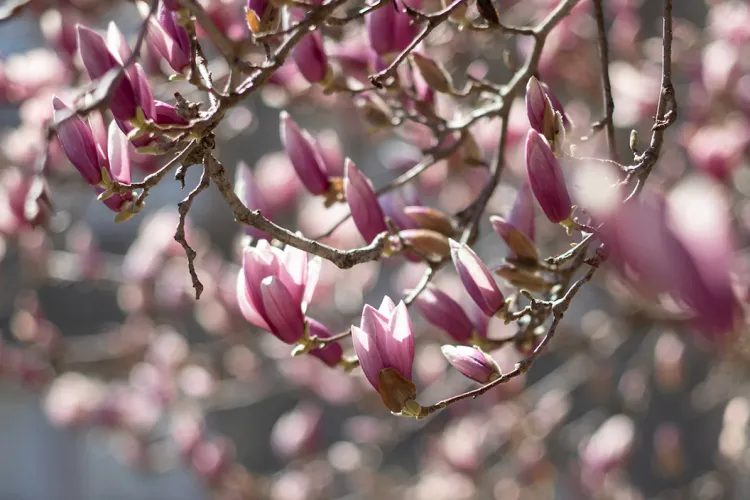
The Swarthmore journeys of music majors and minors Yixin Cui ’25, Yiyang Salome Jin ’25, David Ornelas ’25, Ava Pressman ’25, and Eleanor Rodes ’25 are nearing an end. During the academic year, the seniors reflected on the transformative impact of their studies and looked ahead to futures filled with musical endeavors, both professional and personal.
Additional music senior stories will be published the following week.
Yixin Cui ’25

Yixin Cui '25 (right) and their mother
By David Ornelas ’25
Yixin Cui, a philosophy major and music minor, has been involved with the music-making scene on campus since their first year. Cui has been active in the Chorus and Garnet Singers, Fetter Chamber Music, private lessons, Chinese Music Ensemble, Orchestra, and Lab Orchestra, which has kept them engaged with the sounds of campus as they have simultaneously explored their own sound through composition.
Throughout their time at Swarthmore, Cui has developed their musicianship skills and chops as a composer. They held a special senior recital showcasing vocal, piano, and sign music by Chinese composers, including themself, on April 5 in Lang Concert Hall. This semester also saw the premiere of Twink Death, a music-theater production, or as Cui calls it a “Gesamtkuns-Twerk.” The piece featured a large chamber ensemble and was performed at the Fetter Chamber Music Concert on April 28. Salome Jin, a performer in this unusual piece, comments, “I have never been involved in a more surreal work than Twink Death, and I could not even describe how much fun I had during the rehearsals. Twink Death is an avant-garde piece that brings not only the audience but also us, the performers, a transtemporal and dreamlike experience.”
Cui jokes that their mother intended to “forge a [musical] child prodigy,” and that’s what started them on their path as a musician. That journey began with piano lessons, but soon expanded. “In my sixth year of elementary school, a teacher identified that I had a rare tenor voice and encouraged me to audition for a selective local vocal program,” explains Cui. They ranked first regionally in their auditions and were accepted into one of the top middle schools in the province through the program.
Cui’s focus shifted after middle school, and they drifted away from singing, only to find their way back again at Swarthmore. "In my sophomore year, during a coaching session for a Schubert lieder performance on piano with Zhihan Chen '24, voice teacher Lara Nie encouraged me to sing Zhihan's vocal line to shape our interpretation. This led Lara to persuade me to resume voice lessons.” Since then, Cui has performed tenor solos in Chorus & Garnet Singers, presented Italian and German art songs at Fetter concerts, and was awarded a Freeman Scholarship earlier this year for their promise as a vocalist.
This semester, Cui will debut a new work written for the Garnet Singers at their concert. “The piece ‘Du: nouvelle prière bouddhique,’ where ‘du’ translates to ‘deliverance,’ is a Buddhist-inspired requiem that believes in rebirth and can be sung to non-human creatures.” Cui will also conduct a piece entitled "Õhtul" by Estonian composer Pärt Uusberg at the Garnet Singers concert. “Conducting Garnet Singers has been a distinctly different experience from my work with Lab Orchestra, as choral conducting requires unique strategies. For example, vocal ensembles need warm-ups, unlike orchestras, and singers function as very different instruments with their own lexicon for musical feedback and instruction.” While Cui claims their mother’s attempts to create a musical prodigy were in vain, many around campus have recognized their talent for piano, voice, and composition.
Besides music, Cui has also pursued a philosophy degree while at Swarthmore; sometimes blending the strange worlds of music and philosophy together into topics like autogynephilia in MUSI 022: 19th-Century Music in Europe and the U.S. One of their senior theses in philosophy focuses on the ontology of aleatoric music within the context of the Chinese guqin tradition. For the first year after graduation, Cui will remain around campus as they work with several ensembles, including the Orchestra which will debut Cui's original orchestral compositions in the fall. During that time they intend to work on applications for voice or composition graduate programs in the U.S. If their career pursuits in music don’t work, Cui has noted an interest in law or in philosophy.
Cui’s unique talent and humor was on full display at their recital on April 5, and the performance of their piece, Twink Death, on April 28. Cui also conducted Haydn’s Symphony No. 45 at the same concert as Twink Death. Cui’s new work for the Garnet Singers debuted at their concert on April 25 where they also conducted. This is all in addition to their inclusion in numerous Lunch Hour Concerts and senior recitals for David Ornelas '25, Moss Wacker '25, and Kielor Tung '25. The final personal performance for their undergraduate studies occurred on May 2, where they performed art songs by French composers, including Olivier Messiaen, with Aaron Thammavongxay '25 accompanying on piano.
Yiyang Salome Jin ’25
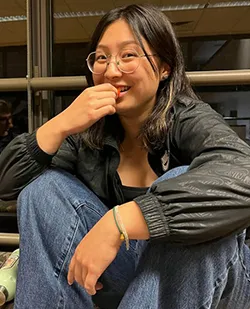
Yiyang Salome Jin ’25
By Alice Lee ’28
For Yiyang Salome Jin, Swarthmore’s musical community redefined what it meant to be a musician. Since coming to Swarthmore from Shanghai, China, Salome has been an integral member of the Music Department, taking part in the Fetter Chamber Music program, singing in the medieval/Renaissance vocal ensemble Critical Mass, and playing clarinet in the Wind Ensemble. Over the years, she has shifted away from musical legalism and instead views music as an activity of liberation. “My mindset was always oriented towards being skillful and ‘good,’” she said, “but I realized it should be more than that.”
Salome double majors in physics and music at the College, but she hadn’t always planned it that way. She took IB music in high school with a teacher who made it a skill-oriented and mechanical discipline. This experience left her unsure about pursuing music in college. Despite her initial discouragement, she joined the Wind Ensemble as a clarinetist, and was encouraged by ensemble director Andrew Hauze '04 to try out some music classes. One music theory class to the next, she started taking leaps of faith. ”I just kept doing that and now I’m a major,” she explains.
Since then, Salome has discovered new perspectives on how to approach, learn, and love music. She got her first taste of musicological research in Professor Barbara Miewski’s 19th Century Music History class. “I had done STEM and social science research before, but music history helped me feel more comfortable researching niche areas,” she explained. This and other music history courses enabled Salome to examine music from a pre-modern perspective. Understanding the historical context behind pieces she was playing deepened her connection to the music itself.
Beyond academics, it was the casual, student-organized music-making experiences that transformed Salome’s relationship with music. Together with Deborah Bergel '24, Yixin Cui '25 and David Ornelas '25, Salome formed The Scuffed Symphony. Over the years, the group performed at multiple Lunch Hour Concerts, arranging stripped-down pop songs for guitar, piano, and vocals. The group helped Salome view playing music as a freeing experience, rather than something to be done in one rigid way.
“We’d rehearse just a few times and go on stage to joke around, change lyrics, and just have fun,” she said. “Because it’s so casual and low pressure, it liberated me from the notion that music has to be ‘correct.’ It’s about the experience and what we can share with the audience — not about being perfect.”
Salome also credits her mentors in the Music Department for helping her to find joy in music making. Thinking back on her time before Swarthmore, she says. “I feel like there is a lack of self-assurance that is so deeply rooted in the culture,” noting that perfectionism and skill-orientation had been something she struggled with as a musician. She points to a moment with vocal coach Debra Scurto-Davis that changed her approach: “She told me, ‘When you’re practicing, start by affirming that you’re doing good things — that you’re on the right track. Then you can make adjustments. Don’t start by telling yourself you did everything wrong.’ That really moved me.”
A comment from Professor Jon Kochavi helped Salome to realize the importance of positive self-affirmation. After a particularly stressful Fetter concert, Jon told me he enjoyed the performance, and that I should take some time to feel proud of myself. I always attributed pride in a performance to meeting an objective standard. His comment made me feel like I could take pride in the progress that I had made preparing the piece and the way in which the music was delivered.”
This shift has helped Salome find peace with both singing and clarinet playing — though she admits she approached them very differently at first. "I had such a strenuous mindset toward the clarinet, and it stressed me out. But singing is such a relieving process,” she said. “It doesn’t have to be stressful. I can just sing.”
“A lot of people who sing [with me] don’t know I play clarinet, and a lot of people who play clarinet with me don’t know I sing,” she added with a laugh.
As she reflects on her time at Swarthmore, Salome is especially grateful for the ease of collaboration and the welcoming musical culture. “If you want to do a project, you can just gather people, and usually, they’ll want to play too,” she said. “At Swarthmore, people encourage you to have fun making music instead of treating it like labor. That’s very precious.”
Salome held a Senior Recital for voice and clarinet on Sunday, April 27.
David Ornelas ’25
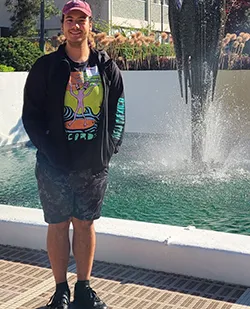
David Ornelas '25
By Aaron Thammavongxay ’25
David Ornelas '25 has always felt intensely drawn to music. From the sound of the notes, to the emotions music evokes, to the very act of listening and processing it, Ornelas loves it all.
Music runs in Ornelas’ family: “On my father’s side, both my grandparents were in mariachi,” Ornelas remarks. “When I went into middle school … my parents … wanted me to pick [an instrument], so I went into strings because I liked the way the viola sounded.” From there, Ornelas joined the Albuquerque Youth Symphony Program, which he describes as “an amazing experience.” However, the years of intense music making and performance took their toll: “When I finished high school, I was burned out … pretty hard … I wasn’t even planning on taking my instrument to Swarthmore.” Fortunately, Ornelas’ mother convinced him otherwise. During his freshman year, Ornelas took Introduction to Music Notation with Senior Lecturer Andrew Hauze '04, which pulled him into the Orchestra and the Music Department as a whole.
Within the department, Ornelas notes how meaningful his experiences in both organized and student-led music making have been. Last spring, Ornelas performed at a Lunch Hour Concert with Deborah Bergel Aquique '24 and Salome Jin '25 under the moniker of “The Scuffed Symphony” to showcase pop and rock songs turned guitar/piano and vocalist duet/trio. “We tried to discern what the most important parts were in a song and implement those in different ways,” Ornelas comments. “We did ‘The Vampyre of Time and Memory’ from Queens of the Stone Age … [and] altered some of the lines into spoken word because [they] exited [Deborah’s] register.” Ornelas recalls the project was a chance for him to experiment with composition and also perform guitar for a wider audience. He also looks back on Professor Lei X. Ouyang’s Taiko and Asian American Experiences class and his participation in Swarthmore’s Production and Jazz Poetry Nights as particularly fulfilling experiences.
While at Swarthmore, Ornelas also cultivated a passion for psychology, which he has combined with his love of music to research the field of music cognition. He describes music cognition as “how we hear music [and] how we process it in our brains” or, put simply, “cognitive science, but with a musical twist.” Ornelas is particularly interested in the study of timbre. “I’ve learned timbre is an enigma,” he says. “We don’t know the best ways to describe it … all we have in science and musicology [are] gross approximations of it [and] … it’s such an interesting idea that [timbre] is something everyone knows but [can’t] describe.”
Ornelas looks back at his time in the department affectionately. “If you’re a student at Swarthmore, take music classes … they’re not easy … but the pain is worth the price,” he urges. Post-graduation, Ornelas hopes to pursue a Ph.D. in psychology so he can continue his studies on timbre and music cognition.
Ava Pressman ’25
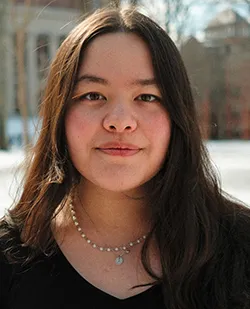
Ava Pressman '25
By Chung Sze Kwok ’27
For Ava Pressman ’25, music is, and has always been, an inherently social experience. These days, she can often be found — and heard — in Lang Music Building leading the alto sections of Chorus or Garnet Singers, performing solo or chamber music in Lang Concert Hall, or singing opera with friends in the Underhill Study Room.
Pressman’s love for singing began in school choirs, where she discovered her passion for collaborative music making. In 2013, she joined the New York City Children’s Chorus. “That was really instrumental in my music development,” she emphasizes, adding that she sang with the group until graduating from high school in 2021. During high school, Pressman also formed a band with two friends to perform traditional Irish music.
Throughout high school, music was an important hobby for Pressman, but as she began to envision her college experience, she wanted more. “I knew I wanted to minor in music… I wanted to continue [music] seriously and improve my skills but not necessarily get a music degree,” she explains. These goals led her to Swarthmore: “I chose Swarthmore because of the rigorous academics, but also [because it has] a music program that would allow me to get as involved as I wanted to without being a music major.”
As she approaches the end of her Swarthmore journey, Pressman affirms that “I’ve gotten the experience that I wanted.” With a major in political science and a minor in music, she believes that she has struck a good balance in her academics, noting that “the music program at Swarthmore has been a really lovely source of social fulfillment.”
Pressman has spent the past four years bonding with fellow musicians in a variety of vocal ensembles. A longstanding member of Chorus and Garnet Singers, Pressman stepped into the position of alto section leader as a sophomore. She has also been involved in a number of small groups as part of the Fetter Chamber Music Program, including Critical Mass and a Fauré set last spring with Sarah Zemelman ’24 and Chung Sze Kwok ’27.
Through Swarthmore’s study abroad program, Pressman experienced choral singing across continents. Her semester in Stockholm, Sweden, she said, was “the best time.” A highlight was joining the Swedish university’s choir, which offered a “deeply rooted” social and cultural experience that was distinct from any American ensembles in which she had participated.
Earlier this semester, Pressman collaborated with soprano Olivia Scarozza ’25 to enter — and win — the Swarthmore College Orchestra’s annual Concerto Competition. As winners, they now have the opportunity to reprise their performance of the “Christe Eleison” from Bach’s Mass in B minor with the orchestra at their concert in April. Winning was a delightful surprise for Pressman, who has found it incredibly rewarding to collaborate with Scarozza. The feeling is mutual; Scarozza remarks that “Ava is such an amazing musician and her keen ear is super helpful in chamber music ensembles! She’s also just such a genuine, dependable, and enthusiastic friend. It’s been a pleasure to get to make music with her over the past four years.” Pressman and Scarozza also performed a set of four duets through the Fetter Chamber Music Program on April 27.
Beyond her collaborative involvements, Pressman has treasured her development as a solo artist and music scholar. “I really enjoyed my experiences in Music 11 and 12… [they] really helped in choir in terms of sight reading and chord analysis, something I hadn’t really been exposed to before.” Among the musicology courses she has taken, Pressman highlights Contesting Darkness: Music, Sound and Place in Gothic Europe with Professor James Blasina, which included a trip to England and France. “We saw some gorgeous cathedrals and bonded very strongly as a group, which was a lot of fun,” she shared.
Pressman was able to take private voice lessons for the first time through Swarthmore’s Music 48 program. Working with instructors Clara Rottsolk, Nancy Jantsch, and vocal coach Debra Scurto-Davis, Pressman has delved into a journey of “improving my vocal technique, but also my stage presence, and bringing stories in songs to life.” Among all her musical endeavors, Pressman declares that Music 48 has “brought me the most joy and fulfillment in my Swat experience; it’s been really fantastic.”
For fans of Pressman, her upcoming collaboration with the Swarthmore Orchestra is not the only performance to look forward to this semester. Since the beginning of the academic year, Pressman has been working hard to assemble a varied and meaningful program for her senior recital, which took place on March 30 in Lang Concert Hall. “It’s a big emotional undertaking and the scope of it is something I’ve never approached before,” she acknowledges. In addition to pieces by Handel and Amy Beach, the heart of her senior recital will be Schumann’s Frauenliebe und Leben (A Woman’s Love and Life), a song cycle that “follows the perspective of a woman as she embarks on life’s journeys.”
Following graduation, Pressman hopes to continue singing with others. Currently, she sings with the choir at St. Clement’s Episcopal Church in Philadelphia. “The folks [there] have been really nice to get to know. It’s been nice to build my social network of singers in the area and get inspiration from them as they’ve carved out what music means for them in their lives, especially since I’m trying to figure that out for myself,” she reflects.
This level of support is by no means unique. As Pressman reflects on her experience with Swarthmore Music as a whole, gratitude is abundant for “everyone who inhabits [Lang Music Building],” including fellow musicians, as well as faculty. “I find that the professors in the Music Department are some of the warmest, most genuinely caring individuals I’ve ever met,” she underscores. “It’s been really inspiring to build those relationships and get advice from folks who have obviously reached a very high level in their music careers… It’s also just really fun to hang around the music building and see if anyone’s door is open. Everyone is always willing to chat, which I really love.”
Eleanor Rodes ’25
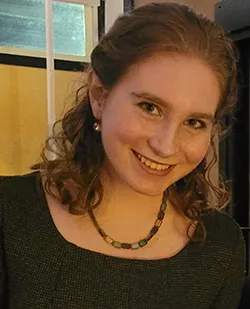
Eleanor Rodes '25
By Mahika Shergill ’26
Eleanor Rodes '25 has been immersed in music for much of her life, drawn to the deep history and storytelling power of ballads and folk music. She first discovered her love for singing at 9 years old, captivated by the narratives woven into traditional songs. That early passion led her to the archives of the American Folklife Center at the Library of Congress. While still in high school, Rodes worked on projects researching New England folk music collectors Helen Hartness Flanders and Eloise Linscott.
“In 2020, I received the Library of Congress' Henry Reed Fund Award, which allowed me to spend my gap year studying the collection of Ozarks ballad singer Emma Dusenbury,” explains Rodes.
By the time she arrived at Swarthmore, Rodes already knew that her academic journey would center around musicology and folklore. What drew her to Swarthmore was the flexibility to pursue both the academic and performance aspects of music, as well as the ability to craft an independent major. Her special major in Music, Oral Narrative, and Social Context has allowed her to bridge her interests in folklore, early music, and archival research, drawing from multiple disciplines across the college.
Designing her major was a challenging but ultimately rewarding experience. “It was definitely a little bit complicated to get it all worked out,” she says, “but it was wonderful to be able to build on my interests through independent studies and tie in courses from the English and broader humanities departments.”
Throughout her time at Swarthmore, Rodes has been deeply involved in the music department, particularly through vocal performance. One of the defining aspects of her musical journey has been her participation in Critical Mass, the college’s Medieval and Early Music vocal ensemble, which she has been part of for most of her time here. “It’s been an incredible experience,” she says. “It’s my favorite group that I’ve ever been in.” She was especially excited to see it become an official ensemble this year.
Beyond early music, Rodes has spent years studying and performing American, English, Scottish, and Irish ballads while also developing a love for operatic music. “It’s been amazing to have such a broad variety of musical experiences here—through lessons, ensembles, and coursework.”
Outside of music, Rodes values the strong sense of community at Swarthmore. “I like that it’s a small campus where you get to know so many people, and the professors are all passionate about what they teach,” she reflects. “The discussions in class are always engaging, and I’ve met a lot of really thoughtful and dedicated students.”
This semester, Rodes is focusing on her senior comprehensive project, which centers on the English composer John Dowland and his lute songs from the late 1500s and early 1600s. After graduation, she plans to take a gap year before pursuing graduate studies, either in library and information science or a folklore program.
Additional music senior stories will be published in the following week.



